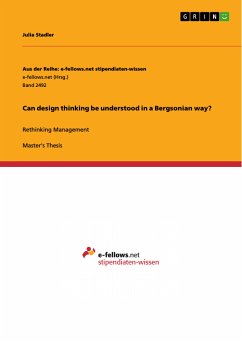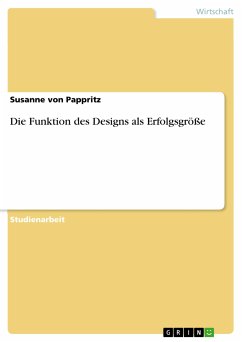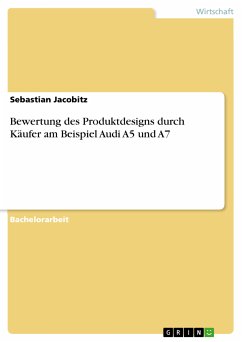Master's Thesis from the year 2017 in the subject Business economics - Offline Marketing and Online Marketing, grade: 18 / 20, ESCP Europe, language: English, abstract: The processual approach of design thinking is supposed to lead to a profound understanding of complex problems as well as to creative solutions. The philosopher Henri Bergson understands life as a creative evolution and defines process and change as the foundations of reality. The goal of this thesis is to find out if design thinking can be understood from a Bergsonian perspective. To date, research has merely elaborated on the link of management and innovation with Bergson's philosophy, however, the link to the quite new approach of design thinking has never been addressed. Therefore, the author conducted an empirical study with design thinking practitioners and systematically related its findings to Bergson's philosophy. The consolidation of both perspectives allows for an alternative understanding of intuition, of the comprehension of problems, of creativity and of the notion of time. Especially in the last decade, design thinking has developed as a problem solving tool for companies which aim to solve complex issues in a creative way. Design thinking is gaining more and more popularity in management practices. Tim Brown, the CEO of the design firm IDEO and a leading advocate of design thinking, states that the reason for this lies in the user centric approach of design thinking which allows for innovative solving of problems. Because of its human focus, empathy and intuition play a large role in the approach. Furthermore, design thinking has a processual character, and is often marked by iteration. So why should this thesis relate the practical approach of design thinking when applied in management to Bergson's philosophy? The answer is that the author feels that in particular intuition and time are neglected dimensions in the literature of design thinking to which Bergson's thought can attribute knowledge and explanation
Dieser Download kann aus rechtlichen Gründen nur mit Rechnungsadresse in A, B, BG, CY, CZ, D, DK, EW, E, FIN, F, GR, HR, H, IRL, I, LT, L, LR, M, NL, PL, P, R, S, SLO, SK ausgeliefert werden.









